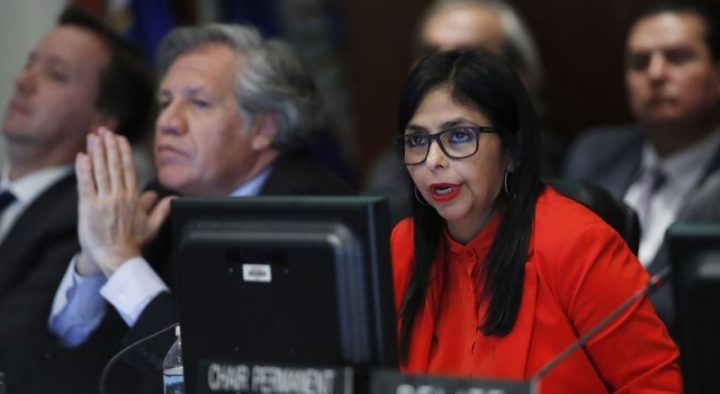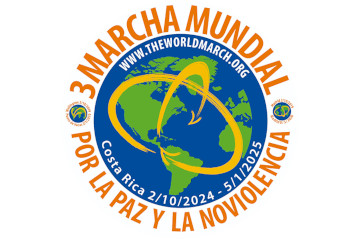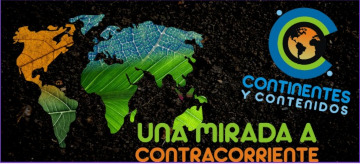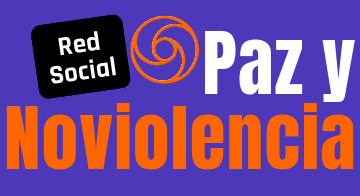Por Nicolas Boeglin (*)
Aprovechando el inicio de la Asamblea General de la OEA que iniciará en Cancún (México) este próximo 19 de junio, el Ministro de Relaciones Exteriores de Guatemala anunció que la Reunión de Consulta de Ministros de Relaciones Exteriores de la OEA sobre Venezuela se reanudará ese mismo día (véase nota de prensa).
A diferencia de otras Asambleas Generales de la OEA, que se realizan en la misma capital del Estado anfitrión, las autoridades de México han optado por otra solución, debiendo prever traslados adicionales para las delegaciones que no puedan llegar y salir con vuelos directos a Cancún desde sus respectivas capitales. Posiblemente Cancún sea además una sede en la que manifestaciones callejeras sean mucho menos visibles, y con un alcance menor al que se pueda tener en México DF: el descontento de una parte de la sociedad mexicana con sus autoridades es latente desde varios años, en particular cuando de derechos humanos y de obligaciones del sistema interamericano en esta materia se trata.
Por su lado, de gira en Centroamérica, el jefe de la diplomacia norteamericana llegó a cumplir una directriz de su Presidente, y exigir a los Estados de Centroamérica un mayor involucramiento sobre el tema de Venezuela, según este cable de EFE (véase nota de prensa). Se ignora si la nueva modalidad de la diplomacia norteamericana consiste ahora en hacer públicos sus llamamientos a otros Estados, en vez de recurrir a la discreción de los canales diplomáticos usuales. De última hora, se informó que el jefe de la diplomacia norteamericana ya no no viajará a Cancún (véase nota de prensa).
Cabe recordar que la Reunión de Consulta de Ministros en la OEA sobre Venezuela del pasado 31 de mayo del 2017 reunió a varios cancilleres de Estados Miembros de la OEA, con la notable excepción del de Estados Unidos y de la de Venezuela, entre otras ausencias, concluyendo sin lograr consensuar un texto final. Fueron dos los textos circulados: un proyecto de resolución circulado por los 15 Estados del CARICOM el mismo día de la reunión (Documento 1) y otro documento, prepararado con mayor antelación pero evidenciando premura en su redacción, propuesto por Canadá, Estados Unidos, México, Panamá y Perú (Documento 2, disponible al final de esta nota).
Políticamente, quiénes convocan a una Reunión de Consulta de Ministros de Relaciones Exteriores obtienen éxito en su gestión cuando logran que lleguen a la cita los titulares de esa cartera ministerial. Fracasan cuando no alcanzan un número significativo de estos. Se trata en efecto de convocar a los cancilleres de todo el hemisferio americano. Enviar a un(a) canciller desde su capital no es igual a enviar a su subalterno(a) (vice canciller) o a un(a) embajador(a). En ese sentido, la presencia física de los ministros durante la cita del pasado 31 de mayo fue la siguiente: los cancilleres acreditados que se hicieron presentes fueron en total 19, a saber los de Argentina, Antigua y Barbuda, Bahamas, Belice, Bolivia, Brasil, Canadá, Colombia, Costa Rica, Guatemala, Guyana, Honduras, Jamaica, México, Panamá, Paraguay, Perú, República Dominicana, y Santa Lucía.
Tuvimos la oportunidad de analizar brevemente los alcances de la Reunión de Consulta de Ministros en la OEA, los de citas previas que convocaron en su momento Ecuador (2012), Costa Rica (2010) y Ecuador (2008), así como los resultados de la reunión celebrada el 31 de mayo pasado sobre la situación en Venezuela, en una nota anterior a la que remitimos a nuestros estimables lectores.
De manera a poder seguir el hilo conductor de esta nueva cita con relación a la anterior del 31 de mayo sobre la situación en Venezuela, reproducimos a continuación los dos proyectos de resolución circulados en aquella ocasión, en su versión en inglés. La principal diferencia entre ambos textos radica en la inclusión y condena que hace el segundo a una Constituyente en Venezuela, y la mención expresa a presos políticos. El primer texto por su parte precisa que toda acción que se prevea en Venezuela deberá contar con la anuencia de sus autoridades. Como se puede apreciar, son diferencias sustanciales, por lo que las negociaciones para obtener un solo texto se anuncian arduas.
De interés resultará también saber cuáles Estados ahora cambiarán de opinión, con base en qué criterios, y con base en qué hechos nuevos acaecidos en Venezuela después del 31 de mayo se añada eventualmente un nuevo párrafo, o se circule un nuevo borrador de resolución. Si Panamá fue el único Estado en Centroamérica en patrocinar el proyecto de resolución, se podrá apreciar cuán efectiva es la diplomacia de Estados Unidos al añadirse a la lista otros Estados de Centroamérica: se vaticina que, pasada la incómoda situación de Honduras (véase nuestra nota anterior sobre el insólito comunicado de uno de sus diplomáticos con relación a Venezuela), este Estado opte por coauspiciar el proyecto de resolución impulsado por Estados Unidos, Canadá, México y Perú. El que el Estado anfitrión (México) sea auspiciante del texto puede también llevar a algunos Estados a aceptar esta vez añadir su firma. Según se informó, la diplomacia de México está desplegando intensas consultas y esfuerzos sobre el tema días previos a la cita hemisférica (véase nota de prensa): al parecer Estados Unidos ha optado por dejarle a México la delicada tarea de reunir 23 votos a favor de algun texto que se adopte sobre Venezuela, segundado por Argentina, cuyo canciller estrena sus funciones con una delicada misión en igual sentido (véase nota de prensa).
Como se puede observar, hay varios parámetros que explican que quiénes convocaron a esta máxima instancia en la OEA para debatir sobre Venezuela hace varios meses hayan ahora optado por intentar aprovechar del espacio que brinda una Asamblea General de la OEA. No obstante, el ejercicio no es exempto de riesgos, al tener la Asamblea General una agenda muy cargada que no siempre permite muchas dilaciones en sus debates.
Además, existe una incertidumbre con relación al formato de esta Reunión de Consulta de cancilleres, ya que es costumbre que una Asamblea General de la OEA inicie con una sesión inaugural en presencia de los cancilleres del hemisferio americano (denominado «segmento de alto nivel» en algunas ocasiones). Con esta nueva cita prevista para el 19 de junio para considerar el tema de Venezuela, se podrá apreciar a) quiénes hacen el viaje a Cancún desde su capital, b) quiénes no y c) quiénes hacen el viaje sin que su canciller asista necesariamente a la cita prevista sobre Venezuela.
Al ser la OEA una organización internacional en la que los intentos de improvisación procedimental suelen darse, no cabe duda que un laborioso fin de semana espera a los asesores legales de cada una de las 34 delegaciones de los Estados Miembros de la OEA.
DOCUMENTO 1
PROPUESTA DE RESOLUCION PRESENTADA POR EL CARICOM
DRAFT DECLARATION ON THE SITUATION IN THE BOLIVARIAN REPUBLIC OF VENEZUELA
THE TWENTY-NINTH MEETING OF CONSULTATION OF MINISTERS OF FOREIGN AFFAIRS,
Reiterating its commitment to the principles of non-interference and of non-intervention as set forth in the Charter of the OAS, as well as to representative democracy which is essential to the stability, peace, and development of the Region.
REAFFIRMING that the promotion and protection of human rights and fundamental freedoms is a basic condition for the existence of a democratic society.
RECOGNIZING that the OAS is an organization of nations that share principles and values constructed collectively to which Venezuela has contributed since the Organization’s inception, including the principles of state sovereignty and independence, as enshrined in Article 3 of the Charter of the OAS
EXPRESSING:
Its friendship and solidarity with the Venezuelan people and its conviction that it is up to the Venezuelans to find their own solutions to the current situation with facilitation and support from the international community.
Its deep concern regarding the political, economic, and social situation in Venezuela, in particular the increase in violence and polarization between the government and the opposition.
The urgent need to put in place a renewed process of dialogue and negotiation, with the full participation of all political actors, based on the principle of good faith.
CALLS FOR:
1. The immediate cessation of violence and hostilities committed by any of the parties, especially those that could cause injury or loss of life.
2. The establishment of concrete plans for the restoration of peace and stability as soon as possible.
3. Absolute respect for human rights, the rule of law and the constitutional processes of Venezuela.
4. All parties to commit to engage in a renewed dialogue and negotiation leading to a comprehensive, political agreement with established timetables, concrete actions and guarantees to ensure its implementation for the wellbeing of the nation.
5. The Government of Venezuela to reconsider its decision to withdraw from the OAS.
DECLARES:
The willingness of member states to offer their help in meeting the serious challenges facing Venezuela, as may be requested by the Government of Venezuela.
Its willingness to establish a group or other mechanism of facilitation to support a renewed dialogue and negotiation between the government and opposition in Venezuela, and to accompany and promote the timely implementation of the parties´ commitments.
Its willingness to remain seized of the situation with due regard to the principles earlier enunciated
DOCUMENTO 2
DRAFT DECLARATION ON THE SITUATION IN THE BOLIVARIAN REPUBLIC OF VENEZUELA
(Presented by the Permanent Missions of Peru, Canada, United States, Mexico, and Panama)
THE TWENTY-NINTH MEETING OF CONSULTATION OF MINISTERS OF FOREIGN AFFAIRS,
REITERATING its commitment to representative democracy, which is essential for the stability, peace, and development of the region, as well as to the principles of non-intervention and solidarity, as set forth in the Charter of the Organization of American States (OAS).
REAFFIRMING that the promotion and protection of human rights and fundamental freedoms is a basic condition for the existence of a democratic society.
RECOGNIZING that the OAS is an organization of nations that share principles and values constructed collectively to which Venezuela has contributed since the Organization’s inception, we invite Venezuela to reconsider its decision to withdraw from it.
EXPRESSING:
Its deep concern regarding the deterioration of the political, economic, and social situation in Venezuela, in particular the increase in violence and polarization between the government and the opposition, as well as the need to address the humanitarian situation in the country.
(Its concern regarding the interruption of the democratic order, and) (PAR), The urgent need to put in place a new process of dialogue and negotiation, with the full participation of all political actors, based on the principle of good faith, in order to establish concrete plans for the peaceful restoration of the democratic order as soon as possible.
Its friendship and solidarity with the Venezuelan people and its conviction that it is up to the Venezuelans to find their own solutions to the current situation with facilitation and support from the international community, (as requested by the parties by mutual agreement).
(AYB) CALLS FOR:
1. The immediate cessation of violence and hostilities committed by any of the parties, especially those that could cause injury or loss of life.
2. Absolute respect for human rights and the rule of law.
3. A halt to the convocation of a National Constituent Assembly as presently conceived.*
4. The cessation of arbitrary detention, respect for the due process of law, and the suspension of trials of civilians by military tribunals.*
5. The fulfilment of the commitments undertaken by the parties, made by the Working Groups during the previous process of national dialogue, with regard to the liberation of political prisoners, respect for the constitutional powers, and the establishment of an electoral calendar with the presence of international independent electoral observers.*
6. All parties to commit to a new process of dialogue and negotiation leading to a comprehensive, political agreement with established timetables, concrete actions and guarantees to ensure its implementation for the well being of the nation.
7. The government of Venezuela to seek international humanitarian assistance
DECLARES:
The willingness of member states to offer their help in meeting the serious challenges facing Venezuela, including steps to provide humanitarian assistance, as may be requested, with support of organizations specialized in this area, and their readiness to establish a humanitarian support group for that purpose.
Its willingness to establish a group or other mechanism of facilitation to support a new process of dialogue and negotiation between the government and opposition in Venezuela, and to accompany and promote the timely implementation of the parties´ commitments.
Its intention to remain seized of the situation.
*In consultation by the delegation of TT
(*) Profesor de Derecho Internacional Público, Facultad de Derecho, Universidad de Costa Rica (UCR).















